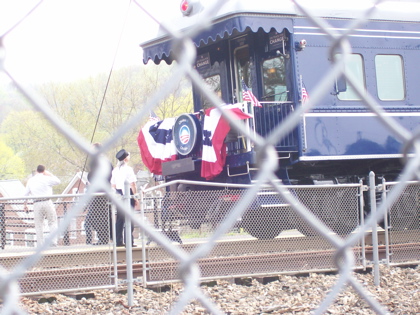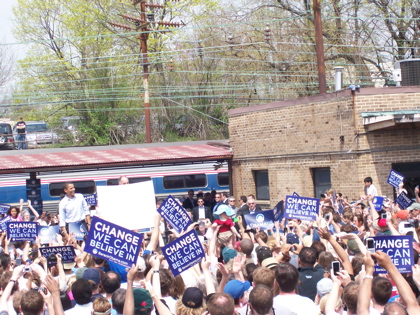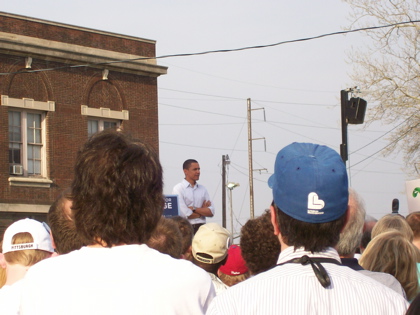
Saturday night Senators Barack Obama and Bob Casey emerged from the south door of the Capitol and, like princes, bathed in light and adulation, descended the long flight of steps to the streetside podium. The moment was fun and exciting and also a bit royal. Underneath the mastery of showmanship was the disconnect between appearance and reality that in both the Obama and Clinton camps now characterizes the last campaigns in what has come to be a fiercely-fought race in Pennsylvania. From the rally Friday night in front of Independence Hall in Philadelphia, which drew at least 35,000 people, to the purposely smaller rally the next night outside the Capitol in Harrisburg, and all the campaign stops in-between, Senator Obama began his remarks with some historical musing about the Founding Fathers, connecting that reflection to his own campaign.
"This is our moment to declare independence from a government that is not working and take it back and make it work for everyone here in Pennsylvania and everybody all across America."
This was great rhetoric verging on the high-flown, for of course Senator Obama's declaration of independence carries with it none of the consequences our Founding Fathers faced: charges of treason, further upheavals in their personal lives and war. Washington, Adams and Jefferson, moreover, would have eschewed royal fanfare.

Learning from the mistakes of Texas, where the Obama Campaign found itself holding a second and necessarily smaller and less effervescent rally in Houston the night before the primary (Houstonians had been there and done that), in Pennsylvania the campaign has paid attention to pacing and momentum. There has been a compelling arc to the campaign here. Senator Obama started out small, easing himself into Pittsburgh and then making a bus tour, with the now-famous Saturday night bowling, through western Pennsylvania. Slowly, he built up to a rally-- and what a rally that was, filling the square between Independence Hall and the National Constitution Center and some of the surrounding streets. Then this past weekend Senator Obama rode the "On Track for Change" train from Philly to Harrisburg, speaking at four suburban train stations along the way. Monday, the day before the primary, Obama will be back in Pittsburgh, where both he and his wife Michelle will take the stage. He will have come full circle.
The whistle stop tour Saturday was yet another example from this long long race of how perfectly Senator Obama captures an American moment. When was the last time anybody on the Philadelphia Main Line gave much thought to a town train station other than as a means to commute? When was the last time a presidential candidate campaigned from a train? Betty Flocken, 91, remembered seeing Wendell Wilkie roll into Lancaster, and she had heard him speak. Mrs. Flocken turned out for Senator Obama, as indeed did thousands of other Pennsylvanians. When I caught up with the Obama train at Paoli, the second stop of the day, I had just come from a Clinton rally at a fire station in West Chester. There had to be eight or nine times as many people waiting for Obama. Suddenly, aside from the fact that of course the people turning out are mostly supporters, making a pilgrimage to the local commuter station became the most exciting way to spend a few hours Saturday. For Obama, the candidate from Illinois, who sees himself walking in another Illinoisan's footsteps, the train campaign was a perfect choice. Even the bunting on the back of the Obama caboose was Lincoln-era. Ironically, however, the 1930s vintage car that had been brought out for the Senator's use was the "General Polk," named after Confederate General Leonidas Polk. And the crowd waiting in the unseasonably hot weather wore not frock coats and top hats, hoop skirts and gloves, but baggy shorts and flip flops, tank tops and tattoos.

Senator Obama could sing the ABCs or recite the phone book to his supporters and they would be happy. The Saturday stump speech bore this out. Obama is already running against McCain, criticizing (and taking out of context) Senator McCain's remark that overall the American economy has been good the last seven years. When Obama says that "the average family income is down for the first time since the 1920s," when he says that "a CEO makes in a day what the average American makes in a year," all this is true, but his Saturday audiences along the Main Line are, by and large, not the Pennsylvanians who have suffered in this economy. These are the people who can afford to live in the beautiful towns of Paoli and Downingtown and in suburban Lancaster. These are the folk whose lives bear out the truth of McCain's observation. Maybe some folk notice the disconnect between Obama's speech and his audience: Main Liners are not the Pennsylvanians out-of-work and living in dying mill towns but the Pennsylvanians who are going to have to sacrifice, according to the Obama vision for our future, in order to help fellow Pennsylvanians. Even if they notice, the train station audiences don't care. They want change, big change--and change is in the air.
Both Obama and Casey clearly were having great fun with the whistle stops; their sunniness and geniality was infectious. Therefore, the tenor of Obama's remarks was all the more curious. Although Senator Clinton is generally considered the negative campaigner, Senator Obama was the one going negative on Saturday. Again and again, throughout the day, he hit her hard. "Senator Clinton has internalized a lot of the tactics that make Washington such a miserable place" (Paoli). "I don't think [lobbyists] are part of the solution, they're part of the problem--but Senator Clinton sees it differently" (Lancaster). Again and again, Obama returned throughout each speech to the bugbear of PACs and Lobbyists, as if that were the main problem and concern of average Pennsylvanians. After she was booed at an AFL-CIO forum in Pittsburgh last Thursday for bringing up Obama's "bitter" comment, Hillary Clinton dropped any mention of her opponent like a hot potato. When I saw her later on Thursday and again on Saturday, she never referred to him. By Sunday, however, she was back on the attack in defense of herself against Obama's Saturday comments. That's the vicious circle this contest has become.
Obama's Saturday speeches presented the more important disconnect between his avowal to get us out of Iraq and his new position on Afghanistan as "a war that we have to win." Iraq is a drain on both the Treasury and our soldiers' lives and families. Our military is seriously depleted and needs to be rebuilt. These are the comments that Obama uses to frame his position on withdrawing from Iraq. It is unclear, therefore, how committing ourselves to victory in Afghanistan, which defeated the Russians before us, is going to be less of a drain and a burden. But Saturday was a beautiful day, and no one seemed to notice that Senator Obama has taken a stronger stance on our involvement abroad. Again, he could say nothing displeasing, even when he continually mis-pronounced "Lancaster."

The afternoon and evening unfolded as leisurely as a daytime dream. The countryside between Philadelphia and Harrisburg is lovely--rolling hills, Amish farms bright and ordered as folk art paintings, fieldstone private schools and academies, one after the other, old churches and full cemeteries, brokerage houses and antique stores, deep-porched nineteenth-century houses that Lincoln might have seen as he passed. The Obama train moved slowly, at a stately pace, even as the Obama rhetoric centered on the trope "we can't wait." "We can't wait to fix our schools, we can't wait to fix our health care system, we can not wait to bring good jobs at good wages right here in Lancaster, we can't wait to bring this war in Iraq to a close." The Saturday speech, like all Obama speeches, turned eventually to greener energy, to solar and wind, but never to what lay at everybody's feet--train tracks--and the need for more light rail in this country. Riding the Amtrak line, Senator Obama never mentioned--at least not in Paoli, Downingtown, Lancaster or Harrisburg--the need to revive rail as part of an encompassing new energy policy.
"We've got four days before we bring change to America," Barack Obama said to the audience waiting for him at Paoli. Even though he almost surely has the Democratic nomination, and although it's hard to see how he doesn't, in the end, beat John McCain, the four days seems a bit of a stretch. The declaration is but one more example not so much of perfervid rhetoric as the toll the hard campaign has taken on Senator Obama. One of the wellsprings of his appeal has always been his ability to connect; now he no longer seems completely grounded. But people want change, and inasmuch as Barack Obama represents change, people want Obama. Change is in the air. Outside Downingtown, as the train passed by, an Amish woman, sitting with her small son in their buggy, struggled to control their horse. Unaccustomed to the number of cars and the crowds, the horse bucked and reared, alternately trying to move back and to lunge forward into the traffic. There's something in the air, and it's name is Barack Obama.
[Tomorrow: the end of the line for Hillary Clinton in Pennsylvania]
----
Images: Mayhill Fowler.
(1) The "General Polk" and bunting; (2) at Paoli Train Station, Saturday; (3) Obama in Lancaster.